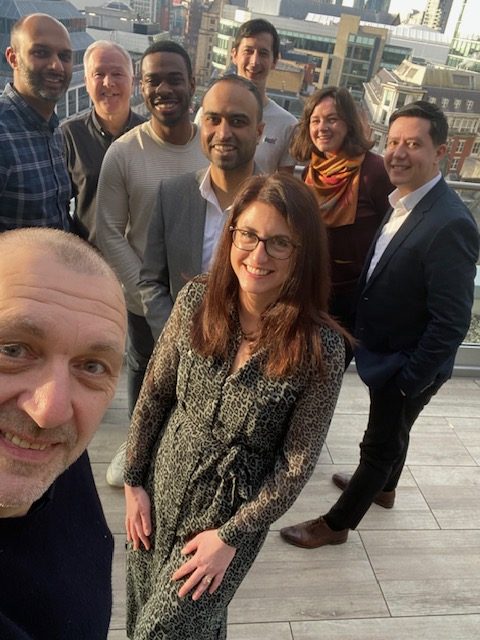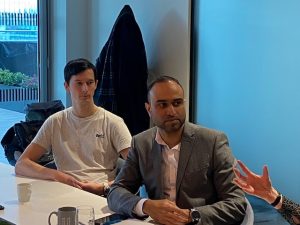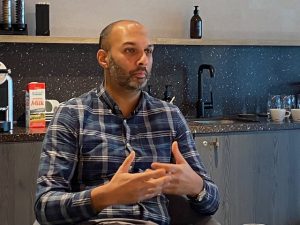Round table report: The law is catching up with a rapidly changing world

Intellectual property issues often are among the most important considerations that a tech start-up will encounter. A start-up will face numerous issues involving developing a product, hiring qualified employees, raising capital, and more. With all of these issues, intellectual property can feel distracting, expensive, or contrary to the goals of just getting a product to market before someone else does.

Eleanor Merrett, partner at CMS said the law is catching up with a changing world of technology, AI and the Metaverse: “Probably unsurprisingly, for everyone around the room. The law is behind tech and behind innovation. And so we are constantly trying to pull the law along behind us. What I particularly enjoy as an intellectual property lawyer is being able to speak to people who are doing all of this innovative work and trying to help them navigate that somewhat difficult landscape of the law. And from my perspective, as a trademark specialist, things like trying to protect brands that are dealing in crypto or NFTs or are looking at the metaverse.
“Clients are saying, do we need to be in the metaverse? How can we protect ourselves in the metaverse? What is the metaverse? And where is it? What country? Are we in? All of those questions are quite knotty and difficult.”

Tom McNamara and Azhar Quaiyoom
Azhar Quaiyoom from Q Sustain, said: “It’s also quite daunting for someone like us. You know, we’re a small company. But we’ve been very fortunate to be up against some really big players in our industry (rail).”
Nile Henry, the Blair Project, said his priority is to future proof his business: “We got some funding from Innovate UK to develop an augmented reality app to teach skills virtually. So we’re working with a company to develop an app that should be ready by the end of this month. But we’re in the process of registering our first set of IP. And one of our concerns is could a big company like a Silicon Valley giant come in and just do it. How is that IP really valuable?”

Eleanor Merrett, Guy Remond, Sarah Klacznska
Sarah Klaczynska, an experienced patent lawyer from CMS, with experience in the pharmaceutical industry, said that entrepreneurs need to think smartly and strategically about an exit and think carefully about where they register patents, because once registered a process starts and it can get expensive.
“Let me give you a brief overview of what the costs are. So first of all, right at the beginning, you’re going to pay a patent attorney to draft your patent application, and then they’re going to file it. And depending on which country, you find that means file it in one country, if you could file it in the UK, and there’s no fee at all, just file it for free at the UK patent office. So your only cost there is the lawyer’s time for drafting your application, let’s say about £10,000. One year later you file, usually what’s called a PCT. And this is like a holding application. PCT is the patent convention treaty. This is like an international worldwide patent convention, and it gives you the potential to file your application, ultimately, in any country in the world, pretty much that’s party to this treaty. So that’s, that’s one year into the process. And then 30 months after the process has begun. So two and a half years is the point at which you decide right? I’ve got this PCT application? Where shall I find that in the world? And at this point, you need to have an understanding of what’s likely to be your key markets in terms of, you know, where are your customers? If you’re manufacturing a product, where are we going to manufacture? Where are our competitors located? Where do our competitors manufacture? All these kinds of considerations go into deciding an international filing strategy. And this is the point that it can become very expensive.”
Guy Remond, director of the Start-Up Factory, said IP is being the new currency and points out helpfully that sorting out IP issues early is regarded as good practice by funders, who can attach a premium to IP when valuing an investment.
“So in any startup, now, I believe that you should be looking within the first six months if not earlier, forming a proper IP strategy and beginning to kind of roll out based on the kind of funds you have available. And when you’re going for investment. Part of that investment should definitely be attributed to IP, it’s really important, because IP ultimately protects the path that you’re playing in.”

Nile Henry and Tom McNamara
Tom McNamara, founder of Free UP, said he gets that it’s more of an asset to a business, than just a defensive protection, more than he probably initially realised.
“So it’s more a case of the strategy as to which pieces of IP protection you go for in what order. From a technical standpoint, patent things as soon as possible. But I think that’s the best approach because you just can’t defend it in the early days, whereas a process makes complete sense. But actually, once you’ve then proven to investors that actually there is traction, so therefore it’s now worth defending at that point.

Hemant Patel
John Willis, innovation manager, Manchester Metropolitan University: “It’s a very challenging conversation. Early stage businesses typically have a good idea around an initial concept or design. They want to secure customers, so they want to tell people about it. They want to secure investments. So they want to tell people about it. But that’s their value.
“One of the biggest, most pronounced challenges is protecting your ideas or designs when you are looking to secure investment, particularly equity investments. The advice we always give our early stage businesses is put some resource and cash into specialist advice, maximise the publicly available advice and the pro bono law clinics that we run. Then if you’ve got a great idea, or that you’re at the point in time, that you’re actively seeking investment, you’re better off protecting your ideas and design.”
Hemant Patel, chief executive of Anumana said: “I mean, this has been a really useful conversation, because when I go into businesses and help try to help them realise that on their data management strategy, they’ve often not considered the fact that IP generated is also the same as the data from analytics will increase the valuation having a competent strategy and aligning that with an IP increasing the valuation even greater.
“But I’m actively considering what the IP plan should be now.”







